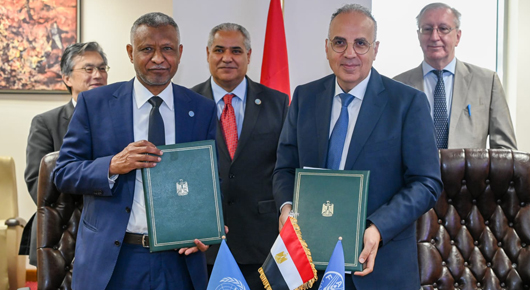
Report highlights 2 Egyptian projects among major clean energy ventures in N.Africa
A report by Energy Capital & Power highlighted two Egyptian projects – Suez Wind Power ...

Egypt and the Food and Agriculture Organization (FAO) signed three agreements for implementing projects aiming at promoting food security and using water in a sustainable manner.
The projects aim to support the Egyptian Government’s efforts to modernize irrigation systems, enhance water productivity, improve food security, and increase farmers’ income.
In a ceremony held at the headquarters of the Ministry of Water Resources and Irrigation (MWRI) in the New Administrative Capital, Hani Sewilam, Minister of Water Resources and Irrigation, and Nasr El-Din Hag Elamin, Representative of the Food and Agriculture Organization (FAO) in Egypt, signed the three agreements to start implementation of three development projects funded by the Netherlands and Japan, namely, the “Monitoring land and water productivity by Remote Sensing (WaPOR phase 2)” and the “Modernization of Irrigation Techniques to Improve the Livelihoods of Smallholder Farmers in Upper Egypt” in partnership with the Government of the Netherlands, and “Enhancement of Agricultural Water Productivity” in partnership with the Government of Japan.
During the ceremony, Minister Sewilam thanked Japan and the Netherlands for financing the implementation of the three projects, and the FAO as an implementing partner for these important projects that aim to modernize irrigation systems, enhance water productivity and support small farmers. He also thanked the Ministries of Foreign Affairs, International Cooperation and Finance for their efforts and continuous coordination with development partners and supporting countries.
Dr. Sewilam explained that the three projects, which will be implemented in cooperation with a wide range of national and international stakeholders, support the Egyptian government’s efforts to modernize irrigation systems, enhance water productivity in agriculture, improve food security, increase crop productivity, increase farmers’ incomes, and support Egypt’s 2030 Sustainable Development Strategy and the National Water Resources Plan for the year 2037, adding that these projects are in line with the ministry’s strategy to expand in the field of modern irrigation based on scientific studies that make such transformation possible through rationalizing water consumption, taking into account the impact of modern irrigation on the rest of the elements of the water system.
He added that the “Enhancement of Agricultural Water Productivity” project and the “Modernization of Irrigation Techniques to Improve the Livelihoods of Smallholder Farmers in Upper Egypt” are complementary to the Ministry’s strategy, which includes the transformation of modern irrigation in sandy lands, sugar cane plantations and horticulture, and the implementation of watercourse development works by converting them into pressurized pipes with a single lifting point system, using solar energy as an energy source, in line with the country’s policy towards expanding the use of environmentally friendly renewable energy.
The Ministry’s strategy also encompasses the formation of Water Users Associations that can benefit from the developed mesqas to participate in the planning, design and implementation and accordingly manage these mesqas and the modern irrigation networks later on, as this helps in facing the challenge of fragmentation of agricultural land owned in the old lands. The strategy also includes capacity building of farmers on the operation and maintenance of modern irrigation systems, while raising awareness among beneficiaries about the benefits of modern irrigation, such as increasing agricultural productivity and increasing farmers’ income.
As for the project on “Monitoring land and water productivity by Remote Sensing”, Prof. Dr. Sewilam explained that this project will enhance the Ministry’s capabilities to take appropriate decisions regarding the improvement of agricultural practices and managing water efficiently, according to the assessment of land and water productivity.
Meanwhile, Abdel Hakim Al-Waer, Assistant Director-General and Regional Representative of the FAO for the Near East and North Africa region, stressed that these three projects contribute to achieving the sustainable development goals, especially the sixth goal concerned with water, and help in overcoming the challenges facing Egypt due to the limited water resources and the decline in the per capita share. The projects also contribute directly to increasing the productivity of agricultural crops, supporting small farmers, and providing them with new income opportunities, as they are the main tool for bringing about a flexible, sustainable and comprehensive transformation in agri-food systems.
Oka Hiroshi, Ambassador of Japan to Egypt, praised the long history of cooperation between Egypt and Japan in the field of water through many projects, on top of which is the construction of the new Dayrut Barrage and the rehabilitation projects of the barrages built on Bahr Youssef, referring to the role of the implemented projects in the field of water in achieving food security, improving the livelihood of small Egyptian farmers, providing them with better opportunities to deal with the challenges of water, agriculture, food, and climate change, and better qualifying them to achieve food security.
Armand Evers, representative of the Dutch ambassador to Egypt, praised the long history of cooperation between Egypt and the Netherlands in the field of water, which dates back to the seventies of the last century, since the establishment of the Egyptian-Dutch Consultative Council, pointing to the importance of modern irrigation projects in providing job opportunities for women and youth, increasing their incomes, increasing crop productivity and rationalizing water consumption, achieving food security and using water in a sustainable manner, especially in light of the challenges facing Egypt in the field of water.
A report by Energy Capital & Power highlighted two Egyptian projects – Suez Wind Power ...
The opening concert of the Annual Meeting 2025 in Davos-Klosters will address the pressing issues ...
Juhayna Food Industries proudly announced that its agricultural arm, El Enmaa for Agricultural Development, has ...


اترك تعليقا